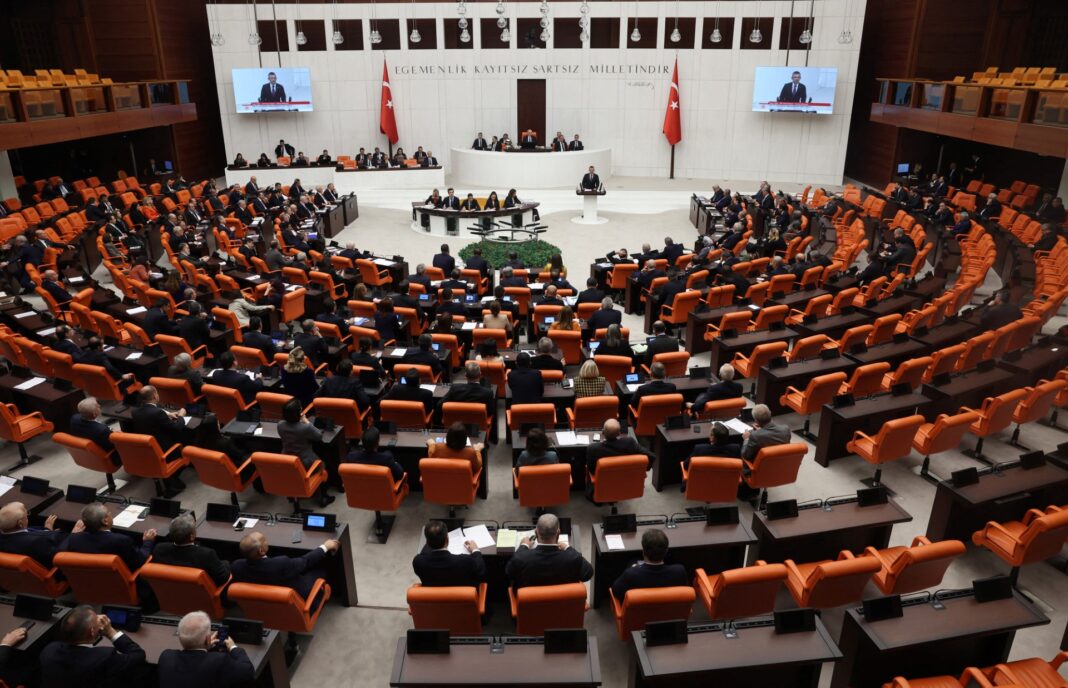Turkey’s parliament passed penal code amendments on Wednesday expanding house arrest and increasing some sentences, attracting criticism for ignoring deeper injustices.
The law, officially titled the Law on the Enforcement of Criminal and Security Measures and Amendments to Certain Laws but colloquially referred to as 10th Judicial Reform Package, was approved by the General Assembly after eight of its 30 articles were removed during deliberations.
The ruling Justice and Development Party (AKP), which holds a majority in parliament, along with its ally, the far-right Nationalist Movement Party (MHP), promoted the package.
Among the key provisions is the expansion of eligibility for house arrest, allowing women, minors, people over 65 and certain sick or disabled inmates to serve longer periods of their sentences at home.
Inmates over 80 years of age may now serve up to six years of their sentences under house arrest, while those over 70 can serve four to five years, depending on age.
Sick prisoners not sentenced to aggravated life can also be released or put under house arrest based on forensic reports confirming they cannot sustain life in prison and pose no significant public threat.
Convicts must serve at least one-tenth of their sentence in prison — no less than five days — before qualifying for supervised release under the new terms.
The reform increases penalties for intentional assault, threats and traffic safety violations, including driving under the influence of drugs or alcohol.
The minimum sentence for aggravated assault now stands at four years if the crime results in lasting injury, facial disfigurement, premature birth or endangers life.
The maximum penalty for threats in aggravated cases has been raised from five to seven years.
Repeat offenders convicted of criminal, but not terrorism-related, charges may now qualify for conditional release, marking a partial rollback of previous restrictions.
However, critics say the legislation sidesteps long-standing demands for equal treatment of political prisoners, many of whom remain jailed under broad counterterrorism laws.
The pro-Kurdish Peoples’ Equality and Democracy Party (DEM Party) condemned the bill as discriminatory, arguing that it deepens a dual judicial system that favors common offenders over political detainees.
DEM lawmakers had pushed for the inclusion of provisions that would allow for the release of high-profile prisoners like former Peoples’ Democratic Party (HDP) co-chair Selahattin Demirtaş, but their proposals were excluded.
The bill was passed after approval by the Turkish Parliament’s Justice Committee on Sunday.
Justice Minister Yılmaz Tunç defended the package as a step toward a more effective penal system, while MHP lawmaker Feti Yıldız called for a broader criminal procedure law and work on a new constitution to follow in October.
Yıldız said the current system is inconsistent and flawed, calling it a “patchwork quilt” that creates unequal outcomes across different regions.
Opposition lawmakers from the Republican People’s Party (CHP), the Good (İYİ) Party and New Path Party criticized the AKP for raising expectations — especially among families of political prisoners — only to abandon promised reforms.
The CHP’s Gizem Özcan argued the bill prioritizes punitive measures over rehabilitation, reinforcing public perceptions of a politicized and repressive judicial system.
İYİ Party lawmaker Hakan Şeref Olgun called the preparation process a “tragedy of law and democracy,” urging the government to correct inequalities created by a law releasing certain prisoners in 2020 during the height of the COVID pandemic.
New Path Party leader Bülent Kaya accused the government of misleading the public by signaling support for sentence reductions that were ultimately omitted from the final version.
The bill’s withdrawn articles included controversial proposals to allow the Information and Communication Technologies Authority (BTK) to block online content without a court order and to toughen penalties for protest-related offenses such as blocking traffic.
The DEM Party warned that the legislation’s failure to address political imprisonment undermines hopes for peace, especially in light of recent developments suggesting possible reconciliation with the outlawed Kurdistan Workers’ Party (PKK).
On May 12 the PKK announced it was prepared to disband following talks with jailed leader Abdullah Öcalan, raising expectations that the government would reciprocate by easing pressure on Kurdish political prisoners.
Instead, critics argue, the government has continued to rely on broad counterterrorism laws to silence dissent and marginalize political opponents.
As of March 2025 Turkey’s prison population had surged to nearly 400,000 inmates, overcrowded by almost 100,000 inmates.
Observers link the prison surge to the government’s crackdown on perceived supporters of the faith-based Gülen movement and protesters denouncing the jailing of İstanbul Mayor Ekrem İmamoğlu.
The government accuses the Gülen movement, inspired by the late Turkish cleric Fethullah Gülen, of orchestrating a coup attempt in 2016, a charge the movement denies.
Since then, tens of thousands of people have been imprisoned or purged from public service in what critics call a sustained campaign of political repression.
“This package does not deliver the substantial changes many had expected from the political reconciliation process between the government and the PKK,” lawyer Ali Yıldız told Turkish Minute.
“While the conditional release of repeat offenders may ease overcrowding in the short term, increasing minimum prison sentences for certain offenses will eventually lead to overcrowding again,” Yıldız said.
With the 10th Judicial Package now law, attention has turned to the upcoming 11th package, expected to address a broader criminal procedure law more comprehensively.
The MHP’s Feti Yıldız urged lawmakers to draft a new enforcement law in October and to follow it with a new constitution that reflects what he called Turkey’s “national and spiritual values.”
Opposition voices remain skeptical, saying that without structural reform and a commitment to legal equality, the amendments serve only to polish the appearance of a deeply flawed system.

